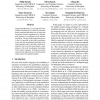Free Online Productivity Tools
i2Speak
i2Symbol
i2OCR
iTex2Img
iWeb2Print
iWeb2Shot
i2Type
iPdf2Split
iPdf2Merge
i2Bopomofo
i2Arabic
i2Style
i2Image
i2PDF
iLatex2Rtf
Sci2ools
EMNLP
2010
2010
Improving Translation via Targeted Paraphrasing
Targeted paraphrasing is a new approach to the problem of obtaining cost-effective, reasonable quality translation that makes use of simple and inexpensive human computations by monolingual speakers in combination with machine translation. The key insight behind the process is that it is possible to spot likely translation errors with only monolingual knowledge of the target language, and it is possible to generate alternative ways to say the same thing (i.e. paraphrases) with only monolingual knowledge of the source language. Evaluations demonstrate that this approach can yield substantial improvements in translation quality.
EMNLP 2010 | Likely Translation Errors | Monolingual Knowledge | Natural Language Processing | Reasonable Quality Translation |
Related Content
| Added | 11 Feb 2011 |
| Updated | 11 Feb 2011 |
| Type | Journal |
| Year | 2010 |
| Where | EMNLP |
| Authors | Philip Resnik, Olivia Buzek, Chang Hu, Yakov Kronrod, Alexander J. Quinn, Benjamin B. Bederson |
Comments (0)

